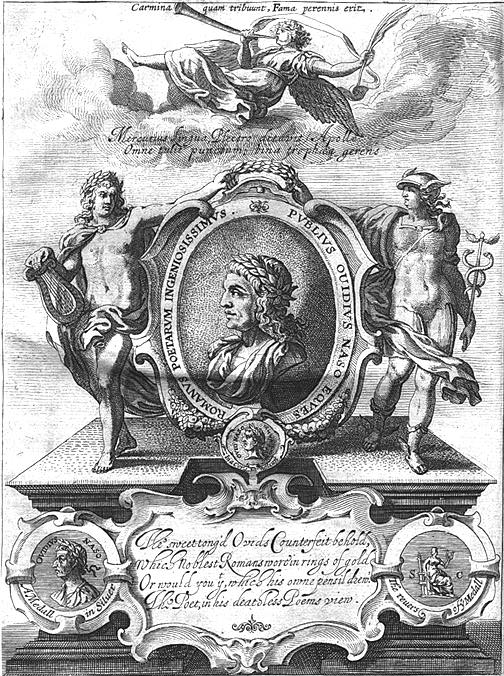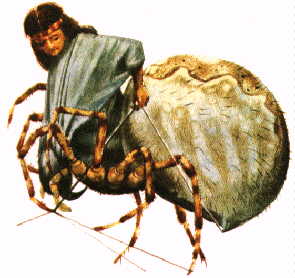
Wednesday, May 2, 2007
The Class Presentations

Tuesday, April 17, 2007
Cupid and Psyche
Friday, April 13, 2007
Apuleius

Thursday, April 5, 2007
Test questions for Monday's Test
2. Define ate (not ate, but aw-tay). Infatuation to the point of being ruined.
3. Who was the original artisan (or artificer)? Daedelus
4. Who is the god of sleep, dreams and disguises ? Morpheus.
5. What shall we avoid at all costs? ** old age
6. Aristophanes' theory of soul mate. humans once were like two sides of a coin, the gods split
apart. We are all looking for the person with whom we were once connected.
7. Tragedy emphasizes the individual, comedy the society.
8. Plato--immortality of the soul? **knowledge and virtue
9. Everything Socrates learned about love he learned from ? Diotima
10.What is Socratic irony? I don't know 'nuthin.
11. What does Icarus fail to do? wax, wings, etc. (he didn't take the middle course, got to close
the sun.
12. Difference in Arachne's and Minerva's weavings? Minerva shows the gods at their finest,
Arachne show the gods at their worst.
13. Final frame in Velasquez's "the Spinners" Rape of Europa.
14. Pentheus means man of constant sorrow.
15. Cadmus **is grandpa of Pentheus
16. Why did Ulysses deserve arms of Achilles? He(Ulysses) started it all.
17. What Shakespeare play was inspired by Procne? Titus and Androius
18. New Comedy? boy wants girl
19. Anagnorisis--recognition, critical moment of discovery.
20. first frame in Ovid? Pan and Syrinx
21. Grace? awareness of God's presence in the world.
22. Omophagia? the eating of live flesh.
23. What is love the child of? poverty and contrivance
24. What was Daphne changed to? a Laurel tree
25. naso? nose
26. How old is The Metamorphoses of Ovid? 2000 years old next year.
27. Why was Aristophanes, speech out of order? He had the hiccups.
** means Dr. Sexson will tweak these questions/answers. They are either too easy or too opened ended as they are now.
Friday, March 30, 2007
A Few Good Lines from Ovid's Metamorphoses

Selecting favorite lines from the METAMORPHOSES OF OVID is a bigger task than it appears. I tried narrowing my search by deciding to take the lines from the eight stories that have been detailed in class.
These lines are not in any specific order. They probably aren't the best known, but lines that seem to have meaning for me today.
On page 78, when Minerva is disguised as an old woman trying to warn Arachne, she says, "'Not all that old age offers is mere chaff: for one, the years bestow experience." As I age, I am grateful for the experiences of my life that have taught me so much and give me wonderful memories.
I guess it is Ovid lamenting Tereus' plans when we read, "O gods, how dark the night that rules men's minds! Precisely when he weaves his plot, he seems a man most dutiful; he wins much praise for what is wickedness." We must include women in the same state when we consider the revenge taken by Procne and Philomela.
But before we become to morose about our condition of being human, we can take comfort from a line Pythagoras' long speech. " . . . and since we are parts of the world, we, too, are changeable, For we're not only bodies, but winged souls;" My mother was always saying we all have it in us to be worse than the worst and better than the best. I don't think she ever read Ovid.
Going along with the last quote, Pythagoras also said, "'Just so, our bodies undergo the never-ending changes: what we were and what we are today is not to be tomorrow." This, to me, is what gives us hope and the will to continue on through our lives. Wherever we are we can always move on and keep trying to better ourselves.
I'll end with a short quote from Pygmalion on page 336. "With his art, he's hidden art." This is saying that he was such a great artist, you couldn't tell the woman he sculpted from ivory wasn't real. But to me it also seems to be saying that life too is art and if we realize it, we can look at it in ways that will improve it. We can choose to take what is beautiful and make it real.
Monday, March 26, 2007
My Favorite Story from THE METAMORPHOSES OF OVID

Arachne is the first story in book five, on page 177. It begins with the goddess, Minerva, ready to punish the lowborn Lydian girl, Arachne. It seems that Arachne had developed her skills at working wool to the degree that she had gained a good deal of fame. Even the nymphs would go to see her work. "One could delight not only in her finished work but find enchantment as her art unfolded:whether she gathered the rough wool in a new ball, or worked it with her fingers, reaching back--with gesture ling and apt--to the distaff for more wool she could draw out. . . one knew that she was surely Pallas' pupil"(177-8).Minerva tried to warn Arachne by appearing to her disguised as an old woman, but Arachne was indignant and demanded a contest. Minerva threw off her disguise and set to work. Side by side they began to weave. Minerva wove a cloth depicting the gods in all their glory. Arachne's scenes "showed the crimes the gods had wrought" (182).
Minerva, also called Pallas, could not find a single flaw in Arachne's weaving. But she became so angry that she began to beat Arachne on the forehead with her shuttle. a shuttle is a very hard wood instrument that is pointed on one end. It fits in your hand and is used to guide the threads through your weaving. It would make a very good weapon. Arachne would rather die quickly and tries to hang herself to come to a quick end. Finally Minerva takes some pity on her and allows her to live, but as a spider. Now she will weave only webs.
Spinning wool into yarn is a hobby of mine. I have never reached much fame and acclaim like Arachne did, but I was on a local TV station demonstrating the use of my spinning wheel. I also raised my own sheep, sheared and dyed wool, and I knit and crochet. I don't weave. A loom takes up a lot of room and is expensive. It also takes a lot of time. But if I were able to add another hobby, it would be weaving.
This story is about so much more than just weaving. It is about excesses of pride. It is about understanding others. If only Arachne had given credit for her god given talents in working wool, she probably would have been allowed to continue in her craft. She should have anticipated how difficult it is to see ones crimes or faults displayed so vividly before one's eyes. Why did she choose to show the worst acts of the gods instead of the best? She could have woven anything else and lived to weave again.
Yes the past is always here with us in the present. How often do we see a very gifted person fall into excessive pride and become unable to be sensitive to the needs and feelings of others? How often that lead quickly to ruin. Many people are arachnephobic. Some simply stomp on any spider they come across. At best, a spider is only able to survive in dark, lonely damp corners of attics and basements, killed or swept away if found anywhere else. I hadn't realized there was so much to be learned from a little spider. No one can weave like Arachne, but all can learn from her story.

